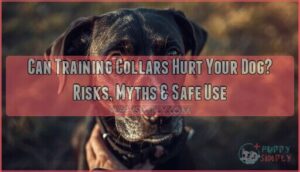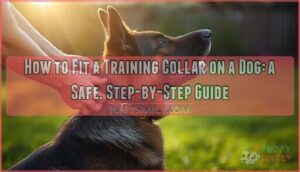This site is supported by our readers. We may earn a commission, at no cost to you, if you purchase through links.

Start with the basics: Can you visit their facility? Meet the mother? See health certificates for both parents? Ask about vaccinations, registration papers, and the entire litter’s condition.
Don’t forget practical matters like age requirements, feeding schedules, and ongoing support. A quality breeder won’t dodge these questions—they’ll welcome them because they care about their puppies’ futures.
The right questions separate puppy mills from ethical breeders who’ll become your lifelong partners in raising a healthy, happy dog, and this distinction is crucial for a healthy and happy pet.
Table Of Contents
- Key Takeaways
- Visiting The Breeder
- Look for The Mother
- Are The Puppies Registered?
- How Old Are The Puppies?
- Are The Puppies Healthy?
- Health Certificate of The Parents?
- Can I See The Whole Litter?
- Are There Any Limitations?
- Are The Puppies Vaccinated and Dewormed?
- How Are The Parents’ Temperaments?
- Frequently Asked Questions (FAQs)
- What questions should I ask before buying a dog breeder?
- What questions should you ask a dog breeder before visiting a kennel?
- What makes a dog breeder good?
- Do top breeders want to interview You?
- Should you choose a dog breeder who shows your dog?
- How do I choose a reputable dog breeder?
- What should you not say to a breeder?
- What do breeders want to hear?
- How do you tell a good breeder from a bad breeder?
- What to ask a golden retriever breeder?
- Conclusion
Key Takeaways
- Visit the breeder’s facility in person to meet the mother dog and observe the entire litter—quality breeders won’t make excuses about protective mothers or infection risks to avoid showing you around.
- Verify health certificates for both parents including OFA certification for hip dysplasia, genetic testing results, and eye clearances, as these documents protect you from future vet bills and heartbreak.
- Ask about vaccination schedules, deworming protocols, and registration papers while requesting references from previous buyers to confirm the breeder’s reputation and commitment to puppy welfare.
- Review the contract carefully for health guarantees, return policies, and ongoing support—reputable breeders welcome your questions because they prioritize matching puppies with suitable families over quick sales.
Visiting The Breeder
Your breeder-selection journey begins with a vital step: visiting their facility in person. Think of it as house-hunting, but for your future puppy’s birthplace. A reputable breeder will welcome facility inspection and never make excuses about "protective mothers" or "infection risks" to avoid showing you around.
Think of visiting a breeder like house-hunting, but for your future puppy’s birthplace.
During house visits, trust your instincts about the puppy environment. Clean, spacious areas with happy, healthy dogs signal responsible breeding practices. Ask about their breeding goals and breeder experience with your chosen breed.
Don’t just focus on viewing puppies—observe how the breeder interacts with their dogs and maintains their facility. Request references from past customers who can share their experiences. A quality breeder will proudly connect you with previous puppy buyers.
If they refuse home visits or seem evasive about their setup, consider it a red flag and look elsewhere for your furry companion. This step is crucial in ensuring you find a breeder who prioritizes the health and well-being of their dogs, and ultimately, your future furry companion.
Look for The Mother
Meeting the mother dog tells you everything about what kind of puppy you’re getting. You’ll want to see her up close – not just from a distance or through photos. A good breeder will happily introduce you to the puppy parents, especially mom.
Meeting the mother dog is like getting a sneak peek at your puppy’s future personality and temperament.
Pay attention to the mother’s demeanor around strangers. She should be friendly or at least calm, not aggressive or overly fearful. Her behavior often passes down to her puppy litter through genetics and early learning.
Check these important aspects:
- Mother’s health – She should look well-fed, clean, and alert with bright eyes and a healthy coat
- Mother’s socialization – Notice how she interacts with people and other dogs in the household
- Postpartum care – Ask about her recovery, feeding schedule, and any complications during birth
The breeder should know her breeding history, including previous litters and any health issues.
Are The Puppies Registered?
Paperwork might seem like a minor detail, but registration status reveals a lot about your breeder’s legitimacy.
Always ask if the puppies come with Kennel Club papers or AKC registerable status.
A reputable breeder will proudly show you the parents’ registration documents and explain the pedigree validity.
Registration importance goes beyond just having official papers.
It provides a traceable lineage that helps identify potential health issues and confirms breed authenticity.
However, don’t let registration fool you into thinking it guarantees quality—some backyard breeders misuse papers as marketing tools.
When reviewing registration benefits, remember that paperwork costs around $30 total ($20 for litter registration, $10 for individual puppy registration).
If a breeder charges excessive fees for registration or seems evasive about paperwork, that’s a red flag.
Quality breeders understand that proper documentation strengthens their breeder reputation and protects both you and your future puppy.
How Old Are The Puppies?
Age matters more than you might think when choosing your new companion. A responsible puppy breeder will be transparent about their puppies’ ages and follow proper weaning protocols.
You’ll want to verify the birth date and confirm the pups meet legal requirements before taking one home.
Here are three key age-related questions to ask:
- **Can you provide the exact birth date and verify the puppies’ current age?
** This helps you confirm adoption readiness and plan accordingly.
- **Are the puppies fully weaned and at least 8 weeks old?
** Proper weaning age confirms puppies have developed essential social skills from their mother and littermates.
- **If any puppies are older than 12 weeks, what’s the reason for the delayed sale?
** Sometimes there’s a perfectly good explanation, but it’s worth understanding why they’re still available.
Remember, puppies shouldn’t leave their mother before 8 weeks old. This timeline supports proper puppy care and healthy development.
Are The Puppies Healthy?
A healthy puppy is your best investment, so you’ll want to examine each one carefully.
Look for bright, clear eyes without discharge, clean ears free of odor, and shiny coats without bare spots or irritation.
Healthy puppies should have similar body conditions—not too plump or bony.
Ask about recent vet examination results and request vaccination records for each puppy.
The breeder should provide genetic screening information and discuss the inbreeding coefficient, which affects genetic disease risk.
A reputable breeder offers a thorough health guarantee covering serious conditions.
| Health Indicator | Good Signs | Red Flags |
|---|---|---|
| Eyes & Ears | Bright, clear, no discharge | Cloudy, discharge, odor |
| Coat & Skin | Shiny, clean, no bare spots | Dull, patchy, irritated |
| Energy Level | Active, playful, good appetite | Lethargic, poor eating habits |
Request documentation of genetic testing and verify the health guarantee covers both immediate and long-term puppy health concerns.
Health Certificate of The Parents?
Looking at health certificates isn’t just paperwork—it’s your puppy’s insurance policy.
A responsible breeder will gladly show you thorough health documentation for both parents.
These certificates prove the breeding dogs have been tested for genetic conditions that could affect your future companion.
Here’s what you should expect to see:
- OFA certification for hip dysplasia and elbow screenings
- Genetic testing results for breed-specific diseases
- Eye clearances from veterinary ophthalmologists
- Current vaccination records and overall health status
Don’t hesitate to ask about the inbreeding coefficient—this number reveals how closely related the parents are and potential genetic disease risks.
A reputable breeder understands their dog breeder responsibilities and will explain each test’s significance.
If they can’t produce health certificates or seem evasive about parent health, that’s a red flag worth heeding.
Can I See The Whole Litter?
After reviewing the parents’ health certificates, you’ll want to observe how all the puppies interact together. Meeting the whole litter gives you valuable insights into each puppy’s personality and social development.
Most breeders allow visits once puppies reach 4 weeks old. During your visit, sit in the middle of the group and watch their natural behaviors unfold. You’ll notice 1-2 puppies typically gravitate toward you – this natural attraction often indicates a good match.
| Observation Focus | What to Look For |
|---|---|
| Puppy Interaction | How littermates play and communicate |
| Individual Assessment | Confidence levels and curiosity patterns |
| Socialization Opportunities | Response to new people and environments |
Understanding litter dynamics helps you spot the right temperament for your lifestyle. Be aware of the potential for littermate syndrome development if puppies are raised together. Don’t feel pressured to choose immediately – multiple visits strengthen your relationship with the breeder and improve your puppy selection process.
Are There Any Limitations?
Before committing, ask about the breeder’s policies or limitations, as these guarantee transparency and protect your future pup.
Reliable breeders should share details about a contract of sale and specific terms like breeding rights or a spay/neuter clause. Clarify their return policy and whether ongoing support is included after adoption.
Here’s what to confirm:
- Breeding Rights: Are you allowed to breed the puppy?
- Spay/Neuter Clause: Is it mandatory?
- Return Policy: Can the puppy be returned if issues arise?
- Training Requirements: Any required classes?
- Ongoing Support: Assistance post-purchase?
Are The Puppies Vaccinated and Dewormed?
Beyond understanding any breeding restrictions, you’ll want to confirm the puppies have received proper veterinary care. Ask about their vaccination schedule and deworming protocol – this shows the breeder’s commitment to puppy health.
Request to see vaccination records for each puppy. Responsible breeders start puppy vaccination at 6-8 weeks with DHPP vaccines, protecting against distemper, hepatitis, parvovirus, and parainfluenza. They’ll also implement a deworming protocol starting at 2-3 weeks old.
| Health Protocol | Timeline | Purpose | Frequency |
|---|---|---|---|
| Deworming | 2-3 weeks | Eliminate parasites | Every 2-3 weeks |
| First Vaccination | 6-8 weeks | Disease prevention | Single dose |
| Booster Shots | 10-12 weeks | Immunity building | Every 4 weeks |
| Final Series | 14-16 weeks | Complete protection | Single dose |
Understanding the breeder’s policy on veterinary care helps you gauge their professionalism. Quality breeders invest in proper puppy deworming and vaccination because 99% of puppies harbor worm infections that can affect both pets and humans. It’s important to follow the recommended vaccination schedule to protect puppies.
How Are The Parents’ Temperaments?
A puppy’s temperament often mirrors its parents, so you’ll want to ask about both the mother’s and father’s personalities, energy levels, and social behaviors.
This information helps you predict whether your future companion will be calm and gentle or active and playful, ensuring the perfect match for your family’s lifestyle.
Contract
A solid contract protects both you and your breeder.
Review all contract terms carefully, including breeding rights restrictions and any spay/neuter clause requirements.
The health guarantee should cover genetic conditions for at least two years.
Check the return policy if you can’t keep your puppy – responsible breeders will take them back.
Verify ongoing support is included in your contract of sale.
Breeding Experience
Understanding a breeder’s experience helps you gauge their expertise and commitment to the breed.
Ask how long they’ve been breeding this specific breed and what their breeding goals are.
Experienced breeders often participate in dog sports and belong to breed clubs, showing genuine passion beyond profit.
Inquire about their breeding practices – do they limit litters annually to guarantee quality care?
Ask for breeder references from previous puppy buyers to verify their reputation.
A knowledgeable breeder should demonstrate thorough breed knowledge, discussing temperament traits and health considerations.
Their puppy breeding experience directly impacts the quality and socialization of your future companion.
Taking The Puppy Home
When picking up your puppy, ask about handover support and what’s included in their starter kit.
A responsible breeder provides ongoing support, detailed instructions for food switch, and maintains a clear return policy.
They’ll explain vaccination schedules, deworming protocols, and honor their health guarantee.
To prepare, consider purchasing a complete puppy kit, which is a complete puppy kit for successful puppy ownership from day one.
Puppy Food
Ask what puppy food the breeder currently uses and request brand recommendations. This information helps with food switch when you bring your pup home.
Quality breeders understand puppy nutrition and can share their feeding schedule and ingredient quality standards. Request specific puppy nutrition advice about dietary needs during different growth stages.
A knowledgeable breeder will discuss proper portion sizes and meal frequency. They’ll also warn you about sudden diet changes that can upset your puppy’s stomach. Good breeders provide puppy food recommendations based on years of experience with the breed’s specific nutritional requirements.
Many owners purchase trusted puppy food brands online for convenience, considering factors like dietary needs and quality standards.
Support
You’ll want a breeder who’s genuinely invested in your puppy’s long-term success, not just the sale. Ongoing support separates committed breeders from puppy mills.
A quality breeder provides thorough ongoing assistance through phone calls, texts, or emails whenever questions arise. They should offer a starter kit containing food samples, toys, and care instructions to ease your puppy’s move home.
Look for these essential support elements:
- Training advice suited to your specific breed’s needs and temperament
- Dog care resources including feeding schedules, exercise guidelines, and health monitoring tips
- Returning policy that guarantees they’ll take back the puppy if circumstances change
- Breeders commitment to serve as your lifelong mentor and resource
Quality puppy breeder support means they’ll celebrate milestones with you and troubleshoot challenges together. Many breeders also offer specialized breeder products to help new owners. This relationship extends far beyond the initial purchase—think of it as gaining a knowledgeable partner in your dog’s journey. Their expertise becomes invaluable during those overwhelming first months and beyond.
Frequently Asked Questions (FAQs)
What questions should I ask before buying a dog breeder?
You’ll want to verify health testing results, ask about facility visits, check parent temperaments, confirm vaccination schedules.
Request references from previous buyers, and make certain they provide ongoing support after purchase.
What questions should you ask a dog breeder before visiting a kennel?
Before visiting, you’ll want to confirm the breeder’s certification, ask about health testing of parent dogs, verify facility inspection policies, and inquire about their experience with your specific breed.
What makes a dog breeder good?
A good breeder prioritizes health testing, proper socialization, and transparency.
They’ll welcome facility visits, provide health certificates, offer ongoing support, and genuinely care about matching puppies with suitable families rather than just making sales.
Do top breeders want to interview You?
Top-quality breeders don’t just sell puppies—they’re matchmakers.
They’ll grill you about your lifestyle, experience, and commitment because they genuinely care where their babies go.
It’s a good sign, not gatekeeping.
Should you choose a dog breeder who shows your dog?
Dog show participation isn’t mandatory, but it demonstrates a breeder’s commitment to breed standards and quality.
Show breeders typically invest more in health testing, proper conformation, and temperament—valuable indicators of responsible breeding practices you’ll benefit from, which reflects their commitment to breed standards.
How do I choose a reputable dog breeder?
Looking for a trustworthy breeder who’ll prioritize your future pup’s wellbeing?
Visit their facility in person, meet the parent dogs, request health certificates, check references from previous buyers.
Make certain they’re asking you questions too, to ensure a trustworthy breeder.
What should you not say to a breeder?
Don’t negotiate prices aggressively, question their breeding ethics without reason, or demand immediate puppy pickup.
Avoid lying about your experience, lifestyle, or living situation.
Never threaten to buy elsewhere if they can’t accommodate unreasonable requests, and be mindful of your approach to ensure a positive interaction, focusing on breeding ethics.
What do breeders want to hear?
Like music to their ears, breeders want to hear you’ve researched their breed thoroughly.
They want to understand that you comprehend the commitment involved, and you’re seeking a lifelong companion rather than an impulse purchase or quick profit.
How do you tell a good breeder from a bad breeder?
Good breeders welcome facility visits, provide health certificates, ask you questions about your lifestyle, offer ongoing support, and prioritize puppy welfare over profit.
Bad breeders avoid visits, lack documentation, and won’t discuss health testing.
What to ask a golden retriever breeder?
Ask about hip and elbow clearances, eye certifications, and heart screenings since Golden Retrievers face these hereditary issues. Request vaccination records, socialization methods, health guarantees, and references from previous buyers.
Conclusion
Some buyers worry that asking all 17 questions you need to ask your potential breeder might seem intrusive or pushy.
However, reputable breeders actually appreciate thorough inquiries because they demonstrate your commitment to responsible pet ownership.
These questions aren’t just formalities—they’re your shield against unethical breeding practices and future heartache.
Remember, you’re making a 10-15 year commitment to a living being.
Don’t settle for incomplete answers or evasive responses.
Your future companion’s health and happiness depend on your diligence today.













